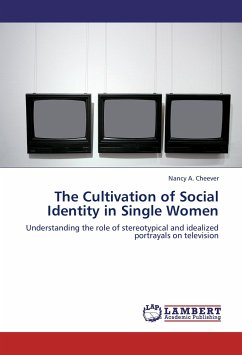As of the last census predictions, non-partnered women made up more than 50% of the U.S. population. This powerful and complex demographic has been largely left out of psychological scholarly inquiries into their identity formation. Research on singles in general has pointed to their marginalization and stereotyping in American culture and its media, and the propagation of marriage and romantic partnership as the ideal condition on American television. This effect is enhanced by the recent popularity of reality dating programming, which depicts a very narrow view of the single woman. The inquiry into television s ability to shape and bolster cultural norms and change people s attitudes and behaviors is well-documented; however, its contribution to social identity is limited. This study examines the association between viewing idealized images on television and single females social identity salience; specifically, how viewing portrayals of single women and romantic relationship on television contributes to the way they identify and define themselves within the group and their levels of desire to change their single status.
Bitte wählen Sie Ihr Anliegen aus.
Rechnungen
Retourenschein anfordern
Bestellstatus
Storno








